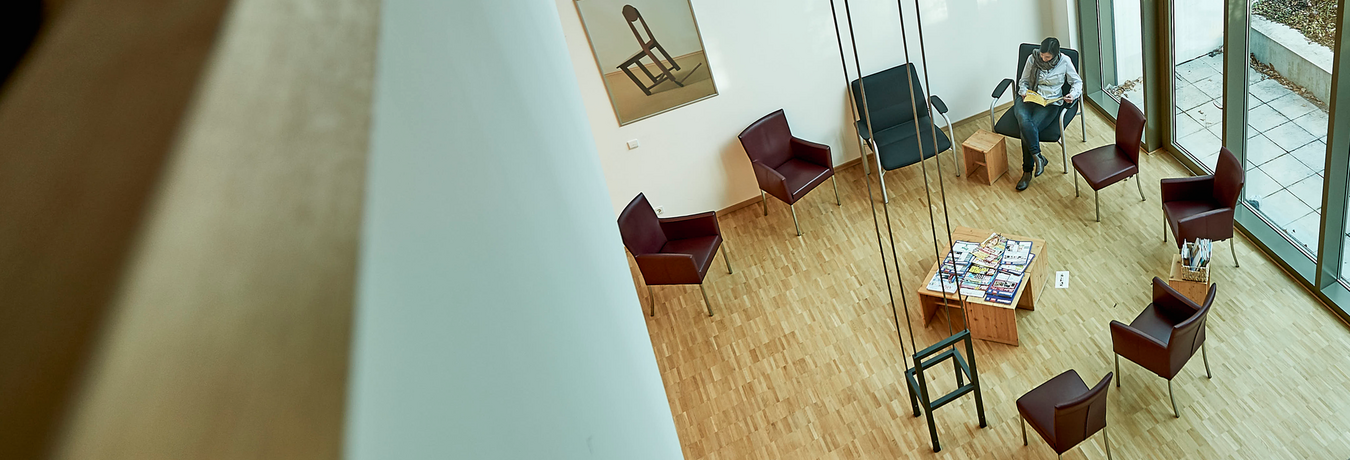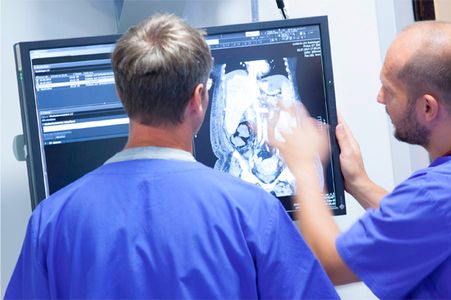Intervening, life-threatening or severe chronic physical illnesses and their treatment often represent a life crisis that unsettles the individual in their usual relationship with life and experiences, requiring a variety of coping and adaptation processes. The psychosocial consequences of physical illnesses and treatment measures in the context of so-called "high-tech" medicine are the subject of consultation and liaison medicine. The range of its interventions is broad and addresses various levels. Essentially, these interventions aim to mobilize and optimize individual and collective processing resources.
The field of consultation and liaison medicine combines fundamental practical experience in patient care with research. The topics covered include psychodiagnostics, crisis intervention, challenges in communicating diagnoses and patient education, disease processing, mapping of internal body representations, quality of life, communication, field exploration, implementation of adjuvant therapy procedures, including accompanying scientific research in the context of model and process evaluation, assessment of the benefits and consequences of interventions for patients and hospital staff, training and continuing education of hospital doctors and nursing staff, stress and burnout, documentation, quality assurance, and health economic issues.
Downloads
Co-operations
exist with the following facilities, among others: Internal Medicine, General and Trauma Surgery, Urology, Anesthesiology, Gynecology, Pediatrics, Orthopedics, ENT, Dermatology, Clinical Genetics, Tumor Center, Psychiatry, Nursing Management, and the School of Nursing.
Care in the Surgical Departments
In the surgical department, we care for patients and their relatives after various surgical procedures and, if necessary, accompany them in the intensive care unit. We pay particular attention to trauma patients, supporting them in the intensive care unit and throughout their treatment. Specifically, we monitor whether patients develop post-traumatic stress disorder during the course of their treatment so that we can provide psychotherapeutic care at an early stage if needed.
Care in the Internal Medicine Departments
In the internal medicine department, we support patients and their relatives in coping with their illness. The focus is on patients with chronic inflammatory bowel diseases, severe cardiovascular diseases, and lung diseases. We also care for patients who are admitted as inpatients due to life-threatening underweight caused by an eating disorder (anorexia nervosa or bulimia nervosa), electrolyte imbalances, or cardiological disorders. In these cases, we provide co-treatment in two steps. In the first step, the focus is on supporting the stabilization of patients in the internal medicine ward. An important aspect of this phase is promoting a holistic understanding of the illness and fostering psychosomatic motivation for treatment. In the second step, if patients are sufficiently stabilized and still require psychosomatic treatment, we can transfer them to our clinic for further care in a timely manner.
Team
Dipl.-Psych. Norbert Gelse
Dr. Vincent Goldberg
Arzt in Weiterbildung zum FA für Psychosomatische Medizin und Psychotherapie
Dr. Christiane Imhof
Ärztin in Weiterbildung zur FÄ für Psychosomatische Medizin und Psychotherapie mit psychoonkologischer Weiterbildung (Zertifikat „Psychosoziale Onkologie“ DKG / WPO)
Dr. Charlotte Mümken
FÄ für Psychosomatische Medizin und Psychotherapie mit psychoonkologischer Weiterbildung (Zertifikat „Psychosoziale Onkologie“ DKG / WPO)
Dipl.-Psych. Katja Oetinger
Psychologische Psychotherapeutin | Spezielle Schmerzpsychotherapie
Dr. Axel Schöps
Psychologischer Psychotherapeut mit psychoonkologischer Weiterbildung (Zertifikat „Psychosoziale Onkologie“ DKG / WPO)
Christiane Viereck
Diplom-Psychologin mit psychoonkologischer Weiterbildung (Zertifikat „Psychosoziale Onkologie“ DKG / WPO) Systemische Familientherapeutin (DGSF)
Group Programme "Moving on in Life"
Psychoeducational Group Intervention for People with Cancer
Tumor diseases are often accompanied by both physical and psychological stress. The lives of those affected are marked by discomfort and limitations in their ability to function at work and in everyday life. The diagnosis is often associated with feelings of existential threat, powerlessness, and loss of control. The disease can impair the quality of life of those affected and is often accompanied by a wide range of psychosocial challenges (e.g. in family life, relationships and the workplace).
With our programme, we aim to provide patients with strategies to cope with these burdens and offer a space to actively engage with the changes brought about by the disease.
Components of Our Programme
- Coping with the illness
- Perspectives
- Relief
- Stress management
- Problem-solving skills
- Relaxation through imagination
- Mutual support
Who Can Take Part?
Our programme is aimed at people who have cancer, regardless of the type of tumor, who wish to actively work towards improving their quality of life. Participation is possible in all phases of the disease. Sufficient mobility is a prerequisite.
The programme is not intended for the relatives of those affected.
The group meets a total of ten times. During these sessions, the group (max. 10-12 participants) remains in its initial composition. Therefore, it would be ideal if participants could attend all sessions.
Costs, Registration & Organizational Matters
The costs are covered by statutory health insurance. You can find detailed information on registration and the procedure in our programme.
Contact & Appointments
You can reach us by telephone during our office hours:
Monday to Thursday: 8:00 - 11:30 and 14:00 - 15:30
Friday: 08:00 - 11:30 a.m.





